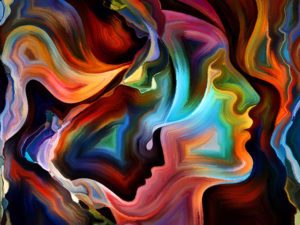Mental Health Awareness

May is Mental Health Awareness Month. To celebrate I interviewed Donna Park, LSCSW, Manager Outpatient Psychotherapy Services at Valeo Behavioral Health Care to get answers to some common questions about mental health.
Why is it important to consider mental health as part of health and wellness?
Because we need to attend to mental health problems with the same vigilance and care as we do physical problems.
I hear people calling their friends "crazy" and "psycho" in passing and it makes me uncomfortable-- what are the correct words to describe someone facing a mental health challenge?
We could all make a long list of the common slang terms used to describe mental health conditions. These types of slang words are deeply embedded in our social vocabularies and they too often trip off the tongue without a thought going to how they contribute to the prejudice and stigma associated with mental health conditions or disorders (correct terms).
Word choice powerfully reflects attitudes. Change the language and a change in attitudes follows. When we make the effort to substitute accurate terms for more derogatory words, we do our part to chip away at the destructive stigma that surrounds mental illness.
You say that stigma associated with mental health issues is “destructive.” Can you elaborate on that?
Stigma is destructive in that it prevents people from getting the help they need, when they need it.
Mental health conditions are actually very common and typically start by early adulthood. Research shows that half of all mental health disorders develop by the age of 14, and up to three-quarters by age 24. Further, 46 percent of us at some time in our lifetime will have mental health symptoms severe enough to qualify as a diagnosable illness or disorder. Yet only 41 percnet of people who have a current mental illness use mental health services in a given year, and the median delay in getting treatment is 10 years.
As with all types of illness, delays in getting appropriate treatment can result in a more severe, prolonged course of illness, and increased likelihood of premature death or even suicide.
Why do people delay getting help?
Historically, and incorrectly, society has believed that people who have a mental health disorder are “weak.” They just need to “snap out of it” and if they don’t, well, they're just not trying hard enough. Who wants to get help when these kinds of judgments might come your way?
If we find ourselves having signs and symptoms of a mental health problem, we may be embarrassed and then ashamed that we can’t just overcome this thing that some people say “is all in your head.” Until we help people understand that a mental health illness is not caused by a character flaw, and these illnesses are comparable to any other type of medical illness, people will be reluctant to seek timely help.
To illustrate, when you have a broken leg, you may be embarrassed about how you came to have that injury (tripping over the cat in the dark, for example), but not by the broken leg itself. So, there is no barrier that stops you from seeking the appropriate medical help. In contrast, people with mental health conditions often actively avoid getting appropriate care, and too often the condition worsens.
How can I support my friend or family member who is struggling with a mental health challenge?
The short answer is to listen, provide support and assist in getting the person to the level of help needed.
Mental Health First Aid is currently used nationally to train people in a five step action plan to assist people struggling with a mental health issue or crisis. Like CPR, it trains people in basic steps that can help people identify a mental health issue and give them ideas about how to be helpful.
The actions recommended include:
1) assess for risk of suicide or harm,
2) listen non-judgmentally,
3) give reassurance and information,
4) encourage appropriate professional help, and
5) encourage self-help and other support strategies.
In Kansas, all of the community mental health centers offer eight-hour Mental Health First Aid training programs. I definitely recommend that people consider taking one of these courses to learn more. People can contact their local mental health center for more information.
How have options for mental health recovery changed over time? Have things improved in recent years?
During the last 30 years our basic philosophy about how to treat mental health conditions has shifted dramatically. Instead of putting people in hospitals for years, we treat them in the community. Instead of having mental health treatment separated out from other types of medical help, we integrate and provide holistic care that includes primary and dental services onsite. We offer a broad range of services that are more attuned to the specific needs of each person. Some good examples of innovations include:
- New, more powerful medications that achieve positive effects more quickly
- In-home delivery of medications to assure daily compliance for those most seriously impaired
- Researched-based psychotherapy that get to problems quicker and help move people towards positive functioning more effectively
- Coordination with police trained in mental health issues, with the capacity to have mental health co-responders riding along with officers on-duty
- Emergency, 24/7 crisis care, including an onsite residential crisis service
- Alternative sentencing courts that allows diversion from corrections to mental and substance health treatment programs
Another change is in use of the term “recovery.” That word now relates to healing from any type of illness or disorder - physical, psychological or behavioral. Recovery may mean anything from a true “cure’ to operating to maximum potential within a fixed limitation.
We now understand that recovery is a unique journey for each person, yet there are usually some predictable phases and challenges. In all of our treatments, we are much more focused on qualities of resiliency and personal strengths instead of just being problem focused.
What can we do to help stop the stigma associated with mental illness?
Take a Mental Health First Aid class to learn more about mental health disorders. Start shifting your language. Be willing to have conversations with family and loved ones about mental health issues. Pay attention to self-care and be willing to get help yourself if you see that you are struggling with anxiety, depression or other types of mental health problems. Read articles like this and contact your local mental health facility with questions or concerns. Educate others. Walk the talk.
Community Resources through Valeo Behavioral Health Care
Crisis Center: 24-hours a day, 365 days a year for mental health emergencies., located at 400 SW Oakley. Anyone experiencing a mental health emergency can walk-in at any time for help and assistance.
Crisis Line: 85-234-3300 and Detox Line: 785-234-3448 answered 24 hours a day, 365 days a year
Mental Health First Aid Courses
May 8 and 9 – 1pm–5:30pm – Mental Health First Aid – Youth Focus
Location: Valeo Behavioral Health Care, 330 SW Oakley, Lower Level Conference Room
August 7 and 8 – 1pm–5:30pm – Mental Health First Aid – Adult Focus
Location: Valeo Behavioral Health Care, 330 SW Oakley, Lower Level Conference Room
Mental Health First Aid Courses are valued at $170. Thanks to a generous grant from the Kansas Health Foundation, they are offered to the public at no charge. Classes must have a minimum of 12 participants.
To sign up for a Mental Health First Aid Course in Topeka or for any questions about the course, please email mhfa@valetopeka.org or call 785.228.3070.













